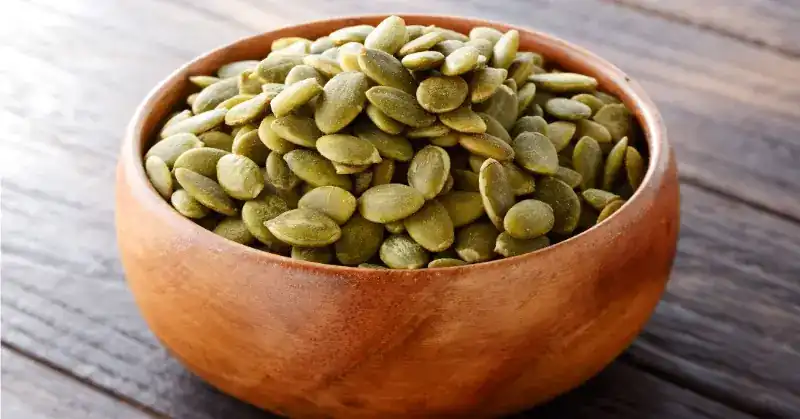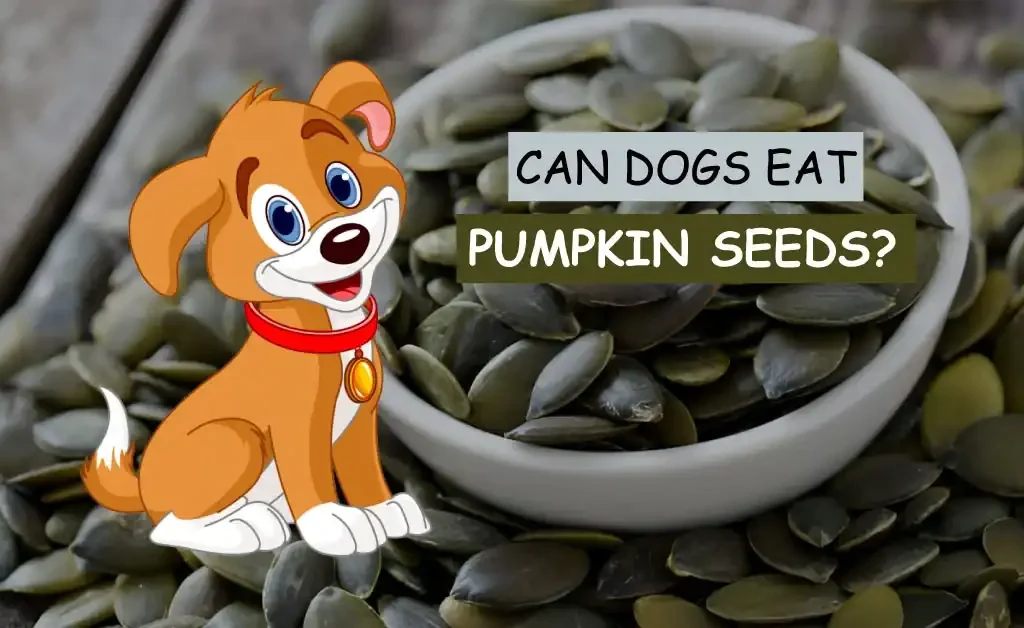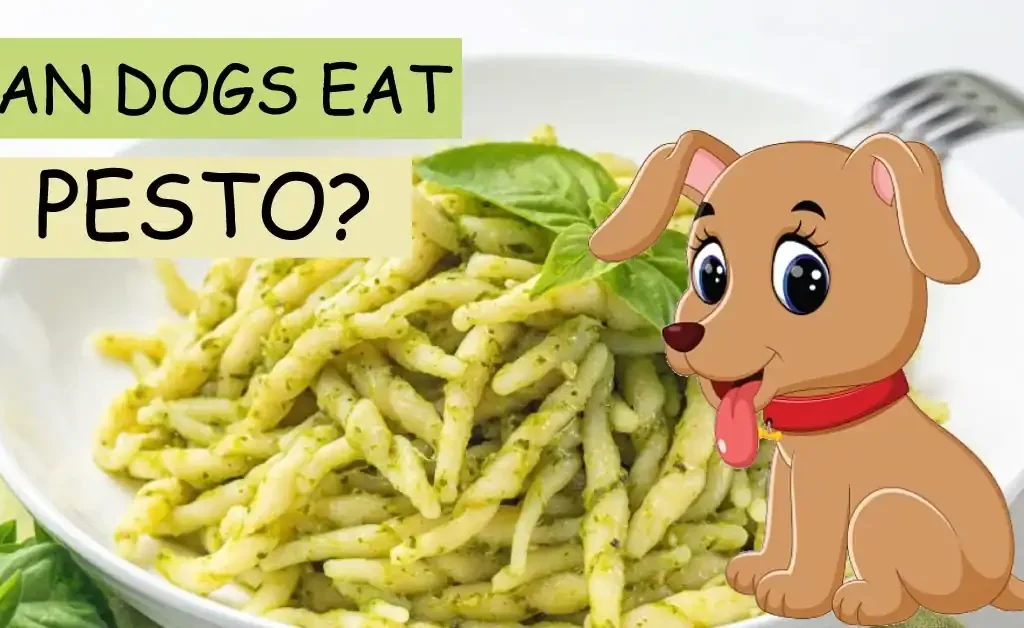People enjoy pumpkin seeds due to their remarkable health benefits, but are they also beneficial for our pets? Can dogs eat pumpkin seeds safely in their diet? Pumpkin is not only nutritious for humans; it also acts as a superfood for dogs.
These seeds are delicious and healthy treats for dogs. They are rich in fats, minerals, fiber, and other essential nutrients. Let’s explore the health benefits and precautions of feeding such seeds to dogs.
Can Dogs Safely Eat Pumpkin Seeds?
Are pumpkin seeds toxic to dogs? They are not poisonous to dogs. They have a range of healthy nutrients essential for our furry friends. These seeds are rich in fibers that aid in digestion. Dogs with digestive problems like gas, bloating, and constipation can safely have these seeds in their diet. This fiber content also relieves anal irritations in dogs. Thus, it helps in killing worms.
Pumpkin seeds help boost dogs’ nutrient levels. They are rich in vitamins C and E, which benefit pups’ coats and skin. Therefore, they are as healthy for dogs as for us. You can enjoy this particular fall season fruit with your canine partner.
It is essential to seek a vet’s guidance about safe feeding methods and precautions before adding them to your pet’s eating regimen. Vets can diagnose your pet’s current nutritional demands and guide you accordingly.

Read more: Can Dogs Eat Strawberry Yogurt?
5 Nutritional Benefits of Giving Pumpkin Seeds to Dogs
Everyone wants a healthy life. If you have concerns about pumpkin seeds’ nutritional health for your furry friends and are exploring what can help you maintain your dog’s metabolism, don’t worry—this article has you covered. Look at the following benefits of feeding them to dogs.
1. Healthy Digestive System
Pumpkin seeds are rich in fiber, and we know that fiber is one of the most critical factors in the digestive system. Fiber helps maintain the peristalsis movement of the gut, improves the movement of the bolus, and can soothe upset stomachs. This ultimately aids digestion and helps with your furry friend’s weight management.
2. Affluent in Healthy Oils
If your dog has any issues in the urinary tract or around the anal regions, pumpkin seed oils are the best supplement for this issue. These seeds are a good source of healthy fats and oils that help support urinary health.
3. Anti-inflammatory
As a pet owner, it is vital to understand what your pet is up to with its health and routine, as pets cannot speak about what they are going through. Providing your dog with ground pumpkin seeds has shown excellent results. They help reduce inflammation for anal gland disease and intestinal health. They also help improve skin and coat health.
4. Aids in Allergies
Pumpkin seeds contain vitamins and minerals. Magnesium, potassium, zinc, and iron are also found in them. The vitamins A, C, and E aid the immune system. These seeds are a natural source of antioxidants, which play an essential role in maintaining free radicals in the body.
Vitamins and minerals aiding the immune system ultimately strengthen your furry friend and hinder the effects of allergies.
5. Omega-3 Fatty Acids
When we talk about omega-3 fatty acids, these seeds are full of them. Specifically, pumpkin seeds are rich in omega-3 and omega-6 fatty acids. Providing your furry friends with such seeds will boost these fatty acids in more significant quantities. These fatty acids support skin and coat health, heart functions, and joint movements and regulate blood sugar levels.
Note: Always offer seeds in moderation to avoid excess fat intake and keep your pet healthy and safe. A balanced diet requires monitoring your furry friend’s diet plan to trace unhealthy elements. It is best to consult a vet for your canine partner’s best and well-balanced diet plan.

Also read: Benefits of Giving Quinoa to Your Dog
5 Possible Risks of Feeding Pumpkin Seeds to Dogs
Following are some possible risk factors that can occur while feeding pumpkin seeds to your furry friend. Being a pet lover, it is crucial to be aware of everything around your pet, especially their diet.
1. Chocking HapHazard
Feeding pumpkin seeds may be a problem for small dogs. They are relatively large, which might increase the chances of sticking in the throat and digestive tract, leading to severe harm and damage to the young ones.
To overcome this condition, it is necessary to have a keen knowledge of feeding pumpkin seeds. Removing shells and grinding the seeds into powder before giving them to your furry friend can avoid choking hazards.
2. Increase Fat Content
As mentioned above, pumpkin seeds have a high fat content, which helps maintain many other mechanisms. However, giving your furry friend a high quantity of seeds can be disastrous, painful, and life-threatening because if the body is high in fat, this can lead to pancreatitis. High fat content is also not good for obese and diabetic dogs.
3. Gastrointestinal Blockages
Feeding a significant amount of those seeds can cause blockage in the gastrointestinal lining. This is because the seeds are large and fiber-rich, and the digestive system can expand, ultimately causing blockage and leading to a severe condition.
4. Digestive Upset
These seeds can also cause digestive upsets in your furry friend. The starting symptoms that indicate a problem are vomiting and diarrhea. Their high fiber content can prompt the loosening of the bowel, GI irritations, nausea, stomach ache, or uneasiness in dogs when given in high amounts. Thus, it is essential to closely monitor the symptoms after feeding pumpkin seeds to your pets.
5. Allergic Reactions
While feeding these seeds to your dogs, check for any allergic reactions or sensitivities. Every breed has a different mechanism, and every dog has a different living condition and diet plan. It is essential to ask your vet before adding such seeds to your furry friend’s diet. Don’t hesitate to call your vet immediately if any concerns arise, such as itching, hives, or difficulty breathing.
Comprising all the key factors that say feeding pumpkin seeds can be a healthy and beneficial treat for your furry friends, it is essential to be aware of any potential risk factors while adding them to your furry friend’s diet plan.
Feed these seeds gradually or in moderation, and remember to remove the shells over the seeds. This can decrease the risk factors and ensure your pet has a great meal. Always ask your vet before adding any new meal to your dog’s eating regimen to learn about the benefits and potential risk factors.

Recommended Serving Sizes
These seeds are healthy and safe for dogs but must not be part of their regular diet. They belong to humans and must be fed to dogs with caution.
Your dog’s exact serving size of pumpkin seeds depends on age and body weight. It is quoted that one pumpkin seed is enough for 10 pounds of body weight. Thus, if your pet weighs 60 pounds, you can feed them five pumpkin seeds per day.
These seeds are recommended for feeding without shells to prevent indigestion issues in dogs. Giving the maximum seed count to dogs every day is unnecessary.
Pumpkin seeds behave well for the dog’s health when given occasionally as a treat. Moreover, consult a pet expert to find the suitable serving size of such seeds according to your pet’s age, breed, and body weight to ensure their health conditions.
Ways of Preparing Pumpkin Seeds for Dogs
There are some basic tips and tricks for preparing these seeds for your dog. You can prepare them in several ways. First, pick the raw pumpkin seeds and remove the shells completely. Then, soak them in cold water in an airtight container for some time. Let them soak until all the shells are removed. This is the easiest way to get rid of pumpkin shells.
You should grind some seeds as recommended per your dog’s needs. Mix a bit of dried powder into your dog’s meal. Being a superfood for dogs with plenty of health benefits, if you feed them inappropriately to your loved pet, it may lead to severe health consequences. Grinding the seeds is the safest way to incorporate them into our pet’s diet.
You can follow another baking procedure for preparing pumpkin seeds for dogs. Ensure that the shells and rotten parts are entirely removed from the seeds before putting them in the oven.
Moreover, you can roast the seeds without seasonings to add them to your pet’s food. Seasonings like salt, spice, or herbs may harm our canine partners and cause various health problems.

Top-Quality Pumpkin Products for Dogs
Can dogs eat raw pumpkin seeds? They can be challenging for our canine friends. However, cooked seeds can be a healthy addition to our pet’s dietary regimen, but only when we do it in moderation. Let’s find some top-quality pumpkin products for dogs to ensure their health.
1. Organic Pumpkin Seed Treats
You can buy natural, organic pumpkin seed dog treats from a reputable market. Natural products are more beneficial and healthy for pets as they are devoid of harmful chemicals or additives. Organic products are available in roasted, ground, or powdered forms.
2. Pumpkin Seed Supplements for Dogs
Pumpkin seed supplements provide various health benefits to dogs. These supplements aid in digestion, urinary health, and boost immunity. Pumpkin supplements are available in capsules, powder, or suspensions. Ensure that you are purchasing them from a reputable pet store.
3. Pumpkin Seed Oil
The antioxidants and essential fatty acids of pumpkin seed oil make it beneficial for our canine friends. Pet owners use it topically or occasionally add it to their regular meals. This pumpkin seed oil supports skin and coat health in dogs. Moreover, it is also beneficial for the canine’s joint and bone health.
4. Commercial Pumpkin Seed Treats for Dogs
Various commercial dog treats are made explicitly with pumpkin seed powder or oil, which highly benefits our dogs. These treats help with weight management and satiety. These pumpkin seed treats also aid in reducing shedding and strengthening the dog’s coat.
5. Veterinarian-approved Pumpkin Seed Products
When buying any pumpkin seed treat for your pup, always choose vet-recommended products to ensure the dog’s health. These products are known for their quality and efficacy. Thus, asking your vet before purchasing new dog treats is best.
6. Pumpkin Peanut Butter Frozen Treats
These treats are prepared by mixing pumpkin pulp with some peanut butter and freezing them. It is essential to check their labels for marketed pumpkin peanut butter frozen treats. Always pick those with reduced amounts of carbohydrates and sugar to avoid health consequences in dogs. Moreover, ensure the treats are free from harmful additives, preservatives, or flavorings.
Always consult your vet whenever you think of adding a new meal or diet plan to your furry friend. Your vet will guide you according to your dog’s breed and metabolism and assist you in maintaining the diet according to your furry friend’s metabolism. Don’t add the meal directly to the diet, but try to add it gradually and monitor the effects of adding a new meal to your dog’s diet plan.
Tips for Feeding Dogs Pumpkin Seeds
They are now the most popular organic remedy for numerous furry friends’ metabolic issues, including allergies and digestive health-related problems. Can dogs eat raw pumpkin seeds?
In this article, we have covered everything, from the crucial factor of understanding how these seeds are fed to the exploration of the seeds’ risks and benefits, along with the guidance provided by the professionals. Let us go further.
Preventive Action and Guidance
It is essential to be keenly aware of pumpkin seeds and to exercise precautionary measures when introducing them to a pet’s diet plan.
- Always start with small amounts to avoid digestive issues such as vomiting and diarrhea. You can also mix pumpkin puree with your dog’s food.
- Present your dog with freshly cooked pumpkin or canned pumpkin, which can be served without sugar and spices.
- Always consult your vet for specific recommendations for your dog’s metabolism and breed.
- Take guidance to avoid any mishaps or health-related issues.
- Watch for your furry friend’s reaction to the new diet plan. There can be allergic reactions or other sensitivities.
- When introducing a new meal, do not add a lot of new foods; they are beneficial if added in moderation.
- Overfeeding can cause several side effects and health hazards, such as allergic reactions and digestive upsets.
- Add ground or raw pumpkin or roasted seeds to your furry friend’s meal for a better option. It’s up to your choice or your dog’s health condition.
- Add pumpkin seeds to regular meals or entertain them as a training prize.
By following the precautions and guidelines mentioned in this article and consulting your vet about these pumpkin seeds, you can increase the chances of introducing them safely and healthily to your dog’s diet. However, never compromise your pet’s health or metabolic circumstances; always follow your vet’s instructions religiously.

Dog-Friendly Pumpkin Seed Recipes
Which pet owner dislikes having a DIY recipe to prepare pumpkin seeds for his dog? We have delicious pawsome pumpkin seed dog bones treats that will boost your pet’s desire and nutrients as well.
Recipe
- Preheat your oven to 350℃. Spread a generous amount of these seeds on a baking tray lined with parchment paper.
- Bake them for at least 1 hour until they become golden brown.
- Take them out and grind to make a fine powder of pumpkin seeds.
- Take 2 medium-sized apricots and cut them to get their pulp only.
- Make a puree from the apricot’s pulp.
- Mix ¼ cup of apricot puree in a bowl with ingredients such as 1 egg, 3 tablespoons of peanut butter, and ¼ cup of applesauce.
- Mix pumpkin seed powder with 1 cup of whole wheat flour in another bowl.
- Beat together the wet and dry ingredients to make a dough. Roll it out to ¼ to ½ inches thick.
- Use a dog bone cutter to cut biscuits from the dough. Place them on the parchment paper lining the baking tray.
- Bake them for 15 to 25 minutes, and then serve to your pet when they have completely cooled.
- You can store the excess biscuits in an airtight container in the refrigerator.
- The recommended serving sizes of this treat are ½ to 1 tsp for pups and 1 ½ to 2 tsp for senior dogs.
How Much Pumpkin Seed Can a Dog Eat?
As a responsible pet owner, you must know the exact and safe dose of pumpkin seeds for your dog. Check out the above tips for feeding dogs these seeds to avoid overeating or other health dangers in dogs. Consulting a vet regarding an appropriate dose of such seeds is essential.
Check out online dog feed articles to avoid the health risk in the long run. However, it is said that the standard dose of pumpkin seeds for dogs is ¼ teaspoon. If you find it challenging to measure ¼ teaspoons, you can follow another counting method.
10 – 20 pumpkin seeds are enough for our canines for a day, but it also depends on your dog’s size, breed, or age. Although they are highly beneficial for dogs’ health, moderation is essential to prevent unwanted health consequences.
Things to Keep in Mind About Pumpkin Seeds and Dogs
Pumpkin seeds and dogs can have a good relationship if pet owners follow moderation and maintain balance. As discussed earlier, these treats are rich in essential nutrients and can be a great superfood for our furry friends. Can dogs eat pumpkin seeds with shells? No. They are safe for dogs in cooked, ground, or roasted forms.
In addition, these seeds are high in fat, leading to problems in dogs. To prevent overweight issues, they should not be included in obese dogs’ dietary plans. Moderation is crucial, as some dog breeds may become allergic to their seeds.
Always read the details of new food before giving it to your pet. You can search for excellent online articles like this one, which will better guide you about your new dog treat. In another case, consult your vet to make informed decisions without compromising your pet’s health. Before feeding, get all possible information regarding pumpkin seeds and dogs.
Final Thoughts
Can dogs eat pumpkin seeds? Several factors regarding feeding your dog pumpkin seeds include the health benefits, risks, preparation tips, and possible side effects. Understanding how to incorporate them into your dog’s diet safely is essential for its well-being.
Frequently Asked Questions (FAQs)
Q: Is 100% pumpkin safe for dogs?
A: Pumpkin seeds are not 100% safe for our furry friends. If given in excess, they may prompt several unwanted health consequences. Thus, moderation is essential to ensure the safety of our pets.
Q: Do pumpkin seeds really get rid of worms in dogs?
A: They contain cucurbitacin, which may have anti-parasitic properties. Thus, these seeds are helpful in deworming dogs.
Q: Can dogs eat pumpkin seeds raw or cooked?
A: Dogs can safely eat raw, cooked, or whole roasted seeds in moderation. However, they should not eat pumpkin seeds with shells, as these could drastically harm their digestive health.
Q: Are these seeds bad for dogs?
A: Seeds are not harmful to dogs if appropriately handled. Before feeding seeds to canines, remove their shells and other rotten edges. Giving them roasted seed powder instead of solid seeds is safe to reduce the risk of choking.




